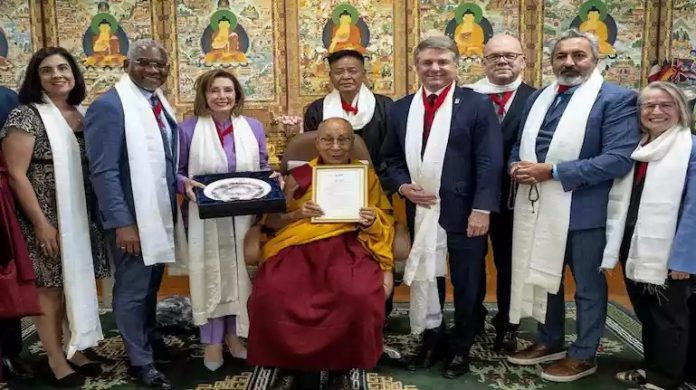Top security official of China Chen Wenqing visited Tibet in the second week of September and instructed the local authorities to step up a crackdown against ethnic Tibetans, branding them as ‘separatists.’ It is a different question who these separatists are as China is in illegal occupation of Tibet. The move by the Chinese Communist Party to step up security in Tibet is believed to be a knee-jerk reaction to the passage in the U.S. Congress of the Resolve Tibet Act which empowers the U.S. government to put pressure on Beijing to hold talks with the Dalai Lama.
Coming from the Head of the dreaded Central Political and Legal Affairs Commission of the CCP, the threat is a cause of serious concern for the Tibetan people. The Commission oversees the vast coercive apparatus of the party-state. It is the main agency of the CCP, headed by a politburo member of the party, to maintain the supremacy of the CCP over the coercive apparatus of the state, to organize surveillance and to supervise campaigns of repression.
In his three-day stay in Tibet, Chen went to the Tibet Autonomous Region and some of the Tibetan autonomous prefectures outside TAR, across Yunnan, Sichuan, Gansu and Qinghai; calling for “resolute crackdown” against separatists, asking local officials to “maintain stability and guard against pro-independence activities.” In the plateau he presided over a meeting on “anti-secession and stability maintenance in Tibet,” indicating a possible increase in surveillance and restrictions.
Reports from the Central Tibetan Administration in Dharamshala in India indicate that the occupation forces of China have already started putting into practice its threat of a “resolute crackdown” in Tibetan areas. They have been trying to suppress the religion, culture and language of the Tibetan people. Now in the name of crackdown on separatists the degree of oppression on the Tibetan people will increase.
Top judges and prosecutors of China have also gone round Tibet in recent weeks. President of the Supreme People’s Court Zhang Jun has visited Tibetan courts and said it is necessary to hand down tough punishment to keep up the pressure on “violent terrorism, ethnic separatism and other serious criminal crimes,” says a report in South China Morning Post. Head of the Supreme People’s Procuratorate Ying Yong has inspected the office of the public prosecutors in Tibet. He has stressed on the need for prosecutors to “harshly crack down in accordance with the law on all kinds of separatist infiltration, sabotage activities and crimes endangering national security.”
The Central Tibetan Administration quotes a report by Radio Free Asia that Lobsang Thabkhey, a 55-year-old Tibetan Buddhist monk, has lately been sentenced to three years in prison after a secret trial. Arrested in June 2023, he was accused of possessing and republishing books from the exiled Tibetan community and for having contact with people outside the region when he had been in charge of the library of Kirti Monastery in Ngaba County in the Sichuan province.
While signing into law the Resolve Tibet Act, a bipartisan legislation passed by the U.S. House of Representatives in July last, U.S. President Joe Biden had said it showed the bipartisan commitment in America to advancing the human rights of Tibetans and supporting efforts to preserve their distinct linguistic, cultural, and religious heritage. He also called on Beijing to resume direct dialogue, without preconditions, with the Dalai Lama or his representatives to “seek a settlement that resolves differences and leads to a negotiated agreement on Tibet.” The Act empowers State Department officials to actively and directly counter disinformation about Tibet by the Chinese government. It also rejects Beijing’s claims that Tibet has been part of China since “ancient times,”
The move of the U.S. government to take steps to protect human rights of Tibetans and to preserve their language, culture and religion has been a badly needed one. According to reports from Tibet reaching the Central Tibetan Administration, in a systematic move to erase Tibetan identity the Chinese government has introduced a policy for education aimed at assimilation of the Tibetans with the Han Chinese identity. Colonial-style boarding schools have been set up in the plateau and young monks from monasteries as well as children from Tibetan families are being asked to join these schools where they are brought up in the Han Chinese way of life and brainwashed to forget their Tibetan identity, language, culture and religion.
In these schools, they are made to undergo intensive political indoctrination and mandatory praise for the Chinese government, are taught in Mandarin Chinese and are prohibited from visiting their families and monasteries during holidays. This leads to their gradual severance from their Tibetan identity. Parents who resist sending their children to these schools are denied public benefits and even imprisoned.
In the latest move, a new propaganda centre called ‘Tibet International Communication Centre’ was launched in Lhasa on September 2 last to reshape international public opinion on Tibet in favour of China; promoting a false narrative about Tibet internationally. One of the first steps of this Centre has been to replace the name ‘Tibet’ with the Chinese name ‘Xizang’ in day-to-day usage.
In the light of this situation, the Central Tibetan Administration has asked for an immediate intervention by the international community, including governments, the United Nation and human rights organizations to protect the cultural identity and religious freedom of Tibetans and to promote their human rights. The passage of the Resolve Tibet Act in the U.S. is a timely move in this direction.









































